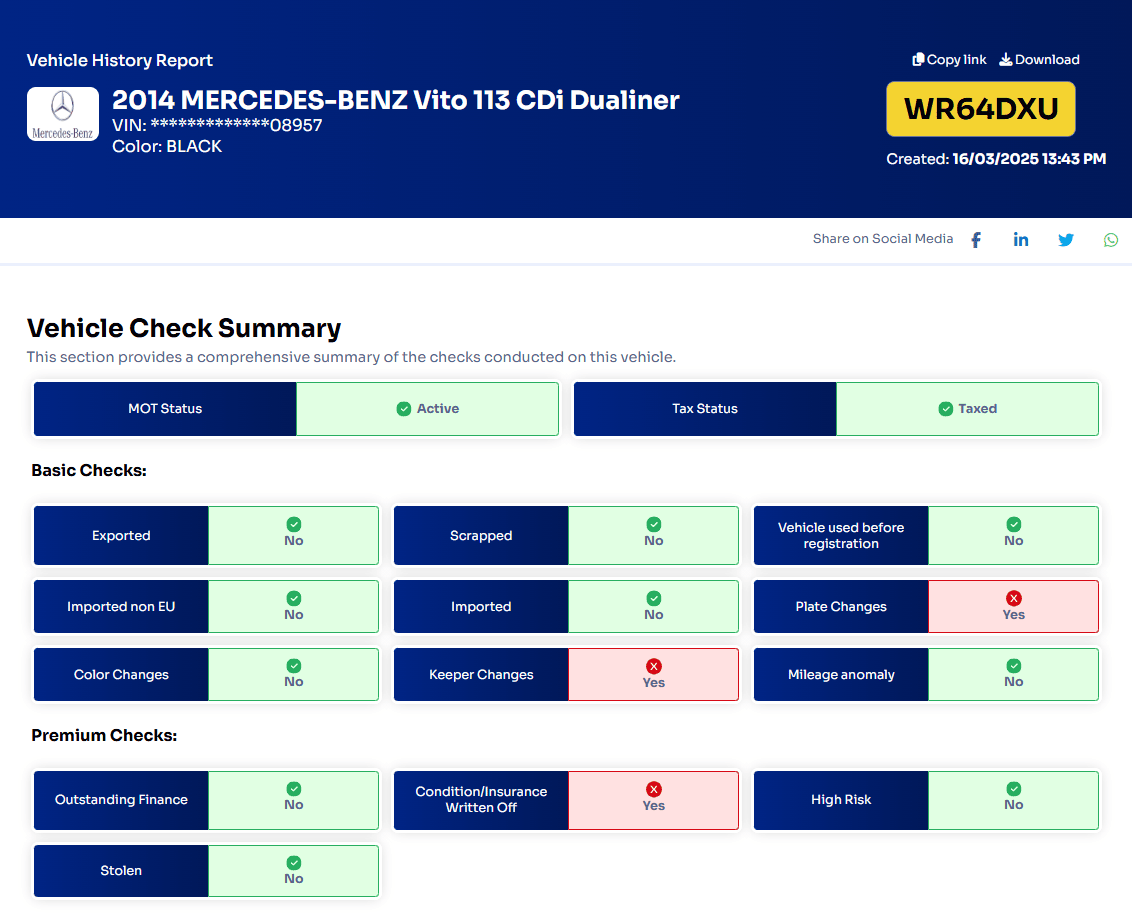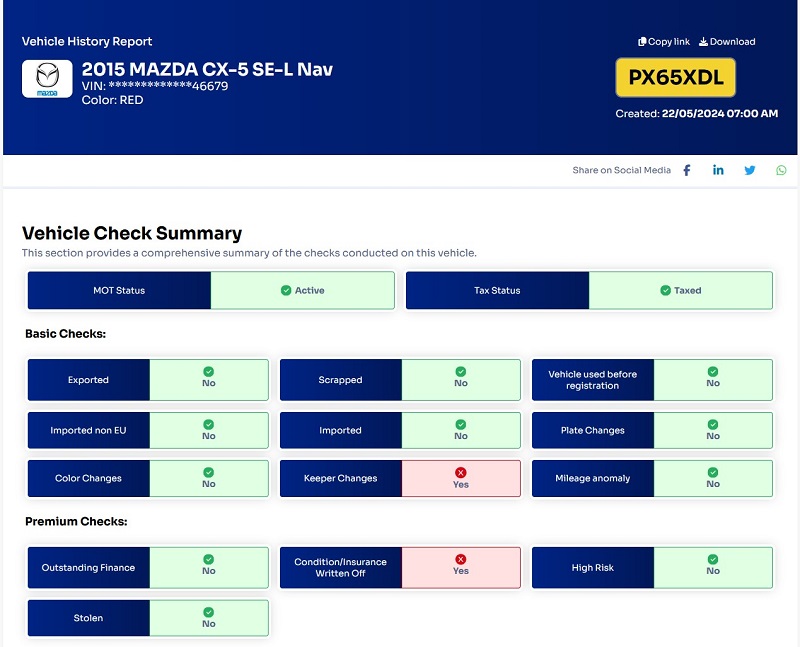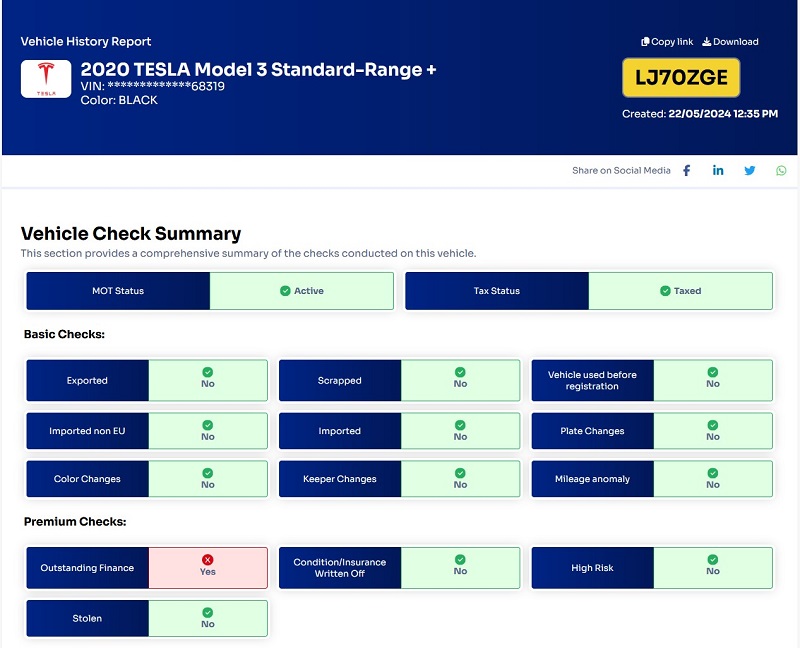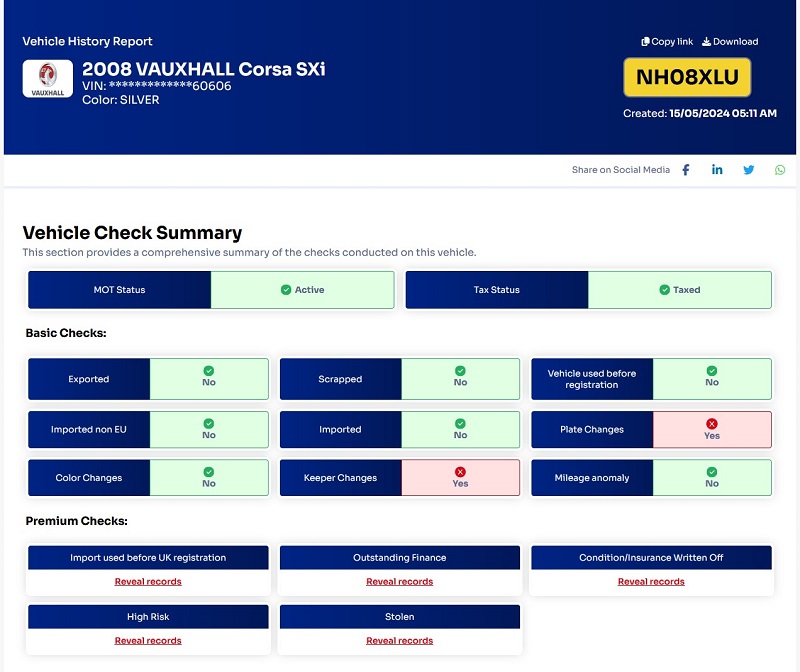- Lowest price check
- Great Customers Review
- Fast and Accurate
- Lowest price check
- Great Customers Review
- Fast and Accurate
Check Full Car Specifications in Seconds
Get a car spec check to see important vehicle details like model, engine specs, fuel type, colour, performance stats, and more. Avoid misdescribed cars and make smarter decisions when buying or selling used cars.
What Is a Car Spec Check?
A car spec check allows you to view a car specifications by registration number. It provides details such as model, engine power, transmission type, fuel type, vehicle dimensions, and more. This helps you confirm what’s under the hood before making a decision.
This check helps you verify that a car matches what the seller claims before you buy it. You can confirm the exact specifications, check if it’s the right model trim, and make sure important details like engine size and fuel type haven’t been misrepresented by anyone.
Why Check Car Specs by Reg?
Performing a vehicle spec check is crucial for anyone buying or selling a vehicle in the UK. Here are top reasons why you need to check car details:
Verify Seller's Claims
Sellers sometimes exaggerate or lie about a car’s features to get more money. A car spec checker reveals the truth about engine size, trim level, and equipment so you know what you’re really buying.
Avoid Cloned Vehicles
Car cloning happens when criminals copy registration plates from legitimate cars onto stolen ones. Checking specs helps you spot mismatches between the plate and actual vehicle before you unknowingly buy stolen property.
Confirm Fuel Economy
Different engine sizes and fuel types affect running costs significantly. Checking specs ensures you know the actual fuel consumption and type so you can budget accurately for petrol or diesel expenses every month.
Check Insurance Group
Your insurance premium depends on the car’s exact specifications and insurance group rating. Verifying specs beforehand helps you get accurate insurance quotes and avoid surprises when your policy costs more than expected.
Identify Correct Parts
Ordering replacement parts requires knowing your car’s exact specifications like engine code and model variant. A vehicle spec check ensures you buy compatible parts that fit properly, saving money on returns and wrong purchases.
Assess Road Tax Costs
Road tax varies based on engine size, emissions, and registration date shown in the specs. Checking beforehand reveals the annual tax amount so you can factor this ongoing cost into your car ownership budget properly.
What is Included in Our Car Spec Check Report?
Our comprehensive car spec check report provides all essential vehicle details and records you need to make informed buying decisions. Here’s what you’ll get:
Free Car Spec Check
Our free car spec check helps with essential information, which is usually the first thing to learn and understand about a car before buying. Here are the details to expect for free:
Basic Vehicle Specifications
- Year
- Make
- Model
- Colour
- Gears
- Engine Size
- Fuel Type
- Engine Cylinders
- Displacement
- Vehicle Type
- Engine Specs
- Emission Standards
Paid Car Spec Check
When you upgrade to our paid car spec check, you will find detailed vehicle specifications, including the engine, fuel consumption, weights and dimensions, providing a complete overview of the vehicle’s identity. Here’s what to expect
Vehicle Description
- Basic specs
- Model code
- Model variant
- Vehicle class
- Nominal engine capacity
- Engine capacity
- Engine number
- Transmission code
- Seating capacity
- Drive type
Engine Specifications
- Engine make
- Aspiration
- Bore
- Cylinder arrangement
- Fuel catalyst
- Fuel delivery
- Fuel system
- Location
- Valve gear
- Valves per cylinder
- Stroke
- Power delivery
- Euro status
Weights & Dimensions
- Car length
- Height
- Width
- Unladen weight
- Payload volume
- Payload weight
- Fuel tank capacity
- Kerb weight
- Wheel base
- Gross vehicle weight
- Gross combined weight
- Max permissible mass
Find More Vehicle Check Records
That’s not all! With the paid car check, you’ll get a detailed vehicle history report to access the past records and condition of a vehicle. Here’s what to find with our car registration check:
Outstanding Finance
Buying a car with unpaid finance means lenders can legally repossess it from you later on.
Written-off Records
Cars declared total losses by insurers may have hidden damage affecting safety and resale value badly.
Stolen Records
Purchasing a stolen vehicle means police will seize it, and you’ll lose all your money permanently.
High-Risk Records
Cars with legal disputes or unresolved ownership issues can leave you without proper legal title to drive.
Detailed Vehicle Specifications
Confirming exact specs ensures the car matches the seller’s claims and helps determine fair market value.
Scrapped Records
Vehicles with destruction certificates shouldn’t be on roads and driving them risks fines and serious danger.
Auction History
Auction sales often indicate salvage vehicles, ex-fleet cars, or problem cars dealers want rid of quickly.
Plate/Colour Change
Frequent changes may hide accident repairs, cloning attempts, or dodgy history sellers don’t want you discovering them.
Ownership Records
Multiple owners in short periods often signal recurring problems that made previous keepers sell up fast.
Imported Records
Imported cars may have different specs, hidden mileage discrepancies, or parts availability issues, causing maintenance headaches.
Exported Records
Previously exported vehicles returning to the UK may have complicated histories or undisclosed problems from abroad trips.
Log Book History
V5C changes reveal ownership transfers and gaps that might indicate the car sat unused or had problems.
MOT History
Past test results show how well-maintained the car’s been and reveal recurring faults or neglected issues.
Road Tax
Current tax status confirms the vehicle is legal to drive today and won’t land you with immediate fines.
VIC Inspected Records
Vehicle Identity Checks on write-offs confirm proper rebuild and prevent you from buying cloned or illegally repaired cars.
VIN Number Check
Verifying the VIN matches registration prevents buying cloned vehicles where criminals copied legitimate car identities fraudulently.
How to Run a Car Spec Check
Running a car spec check with Smart Car Check is quick, simple, and takes just seconds. To check car specification, follow these steps:
Step 1: Enter the Registration Number
Enter the vehicle registration number in the form above or search by VIN check.
Step 2: Run the Car Spec Check
Click on the “Search” button to initiate the search.
Step 3: Get Car Specifications for Free
Our tool will provide you with vehicle specifications, including year, make, model, colour, engine specifications, and more. Upgrade to a paid car check to lookup detailed specifications, ownership history, finance, writeoff, stolen records, logbook changes, and more.
Check Smart Car Check Sample Reports
What’s Your Car Spec Check Telling You: Warning Signs ⚠️
During a vehicle specification lookup, watch out for these red flags that could mean the vehicle has problems or isn’t legitimate.
Mismatched Registration and VIN
If the registration plate details don’t match the VIN specifications, the car might be cloned or stolen. Walk away immediately and report it to the police.
Wrong Colour Listed
When the official colour doesn’t match what you see, the car’s been resprayed. This often hides accident damage or rust that sellers don’t want you to know about.
Engine Size Doesn't Match Advert
Sellers sometimes advertise bigger engines than the car actually has to attract buyers. Check car specs by reg carefully because smaller engines mean less power and different running costs.
Import/Export Discrepancies
Cars imported from abroad sometimes have different specs than UK models. Check if it meets British safety standards and if parts will be easy to find locally.
Can I Use Smart Car Check’s Car Spec Checker Outside the UK?
Yes. Smart Car Check works anywhere in the world as long as you have internet access and want to check UK-registered vehicles. If you’re in Europe, Australia, or North America, you can use our tool to verify cars, motorcycles, vans, and trucks registered in the United Kingdom.
Our service is perfect for international buyers purchasing UK vehicles for export or people living abroad who want to check a car before travelling to England to view it. You just need the UK registration number to get complete specifications and history, no matter where you are.

Get the Smart Car Check Mobile App
Looking for the best car history check in the UK? Download the Smart Car Check App today. With just a registration number, you can instantly detect hidden history, past problems, or issues the seller won’t mention. Make smarter, safer decisions before buying any vehicle.
Frequently Asked Questions about Car Spec Check
What spec is my car?
To know your car’s exact specification, enter your registration number into our vehicle spec check tool. You’ll see the year, make, model, trim level, fuel type, and more. It’s fast, accurate, and hassle-free.
Is the car specs check service completely free?
Not completely free. You can get a free car spec check to access basic vehicle specifications, like the model. Colour, engine, MOT status and expiry date, Tax status and expiry date, and more. However, if you want a complete car history report with outstanding finance, insurance write-off, theft, mileage, MOT history, and more, you need to pay a fee to access these records.
Should I buy a full car history check?
Yes, buying a full car history check is recommended. It gives you comprehensive information about a vehicle’s history, including previous keepers, MOT history, mileage records, and more. This thorough report helps you make a more informed decision.
Why should I use this service instead of the GOV.UK vehicle tax service?
Our service provides more than just vehicle tax information. With our car check service, you get access to a comprehensive report that includes MOT history, outstanding finance checks, mileage records, and more. It offers a more detailed and holistic view of the vehicle’s history and condition than the GOV.uk site.
Why is it important to perform a car spec check before purchasing a used vehicle?
Performing a car spec check helps you avoid wrongly advertised cars or buying a vehicle with hidden issues like outstanding finance, previous accidents, or illegal modifications.
How reliable is the information provided in a car spec check?
Our car spec check tool uses official databases and reliable sources to provide 100% accurate, up-to-date information about a vehicle’s specs and history.
So, which vehicle check is right for you?
If you’re buying a used car in the UK, we would recommend you get a full car check which provides instant access to every record about the car’s past, value and condition. It also provides an insight into the future running cost considering the mileage, number of previous keepers, and past accidents.
How do I check my car's dimensions?
You can check your car’s dimensions by using Smart Car Check car spec check tool. It provides accurate measurements for length, width, height, and wheelbase. Just enter your registration number to get instant results.
How much horsepower does my car have?
Use our car spec checker to show your car’s horsepower, engine size, and torque output. This helps you compare performance across models. It’s ideal when buying or upgrading your vehicle.
How to check my car's performance?
To lookup your car’s performance, use our car spec check to find details like the torque, BHP/HP, top speed, acceleration, and more. It gives you a clear view of how the vehicle performs. This is also perfect for comparing used cars or models.
Can I find my car spec from its number plate?
Yes, the number plate is all you need. A car specs by reg check will return all key details instantly. It’s the easiest way to understand your vehicle’s specs.
How do I find car details by registration?
To find car details by registration, enter the reg number into our car spec check tool to view basic information like the make, model, colour, engine, MOT and tax status and more. For full vehicle records including writeoff, finance, theft, scrapped status, and more, upgrade to get the complete car check report.
What engine do I have in my car?
To find out what engine your car has, simply use our free car spec check or VIN decoder UK to know the engine specs like size, displacement and configuration (e.g. V6, I4, etc). You can also know by checking the vehicle’s documents, like the V5C logbook, and the owner’s manual.
What is the specification of my car?
You can find car specifications by registration number. Just enter the number plate into our vehicle spec check tool for a full vehicle specification lookup. You’ll find details like the year, make, model, transmission, colour, engine, emission standards and more.







